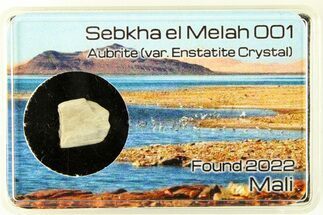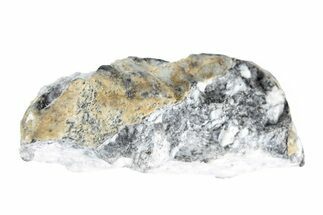This Specimen has been sold.
.46" Tiglit Aubrite Meteorite (1.16 g) - 2021 Witnessed Fall!
This is a .46" wide (1.16 gram) fragment of the meteorite known as Tiglit, an unusual kind of achondrite called an aubrite. They are meteorites made of entstatite in igneous and impact-melted clasts that likely come from E-type asteroids. It comes in an acrylic display case.
About The Tiglit Meteorite
Tiglit is the name given to a witnessed fall that occurred around 8:30 PM on December 9, 2021 over the villages of Tiglit and Oued Tiglit in southwestern Morocco. Several eyewitnesses reported seeing a greenish light and hearing several explosions, then a high-pitched noise "like a bang in a tin bucket". The next day, locals collected numerous fragments from the surrounding valley, which smelled strongly of sulfur. Since its fall, about 2.2 kilograms of material have been recovered.
Tiglit is an aubrite, a brecciated enstatite achondrite. It displays a multicolored fusion crust, ranging from green to orange and brown. The meteorite itself is quite fragile, but its interior consists largely of enstatite, though occasional diopsides, olivines, and black needles or grains of pyroxenes can also be found. Its interior is highly shocked: melt pockets and and veinlets can be found throughout.
Meteoritical Bulletin: Entry for Tiglit
Tiglit is the name given to a witnessed fall that occurred around 8:30 PM on December 9, 2021 over the villages of Tiglit and Oued Tiglit in southwestern Morocco. Several eyewitnesses reported seeing a greenish light and hearing several explosions, then a high-pitched noise "like a bang in a tin bucket". The next day, locals collected numerous fragments from the surrounding valley, which smelled strongly of sulfur. Since its fall, about 2.2 kilograms of material have been recovered.
Tiglit is an aubrite, a brecciated enstatite achondrite. It displays a multicolored fusion crust, ranging from green to orange and brown. The meteorite itself is quite fragile, but its interior consists largely of enstatite, though occasional diopsides, olivines, and black needles or grains of pyroxenes can also be found. Its interior is highly shocked: melt pockets and and veinlets can be found throughout.
Meteoritical Bulletin: Entry for Tiglit
About Aubrites
Aubrites are a unique class of achondritic meteorites that represent some quite extreme formation conditions in the early solar system. Aubrites are almost all breccias consisting of whitish enstatite, with occasional inclusions of olivines, nickel-iron, and troilite, along with impact-melted clasts seen in achondrites.
Enstatite is a form of orthopyroxene that forms in igneous conditions and is considered an early stage of mineral formation in the solar system. Enstatite meteorites likely originate from E-type (enstatite-rich) asteroids close to the sun, particularly the near-Earth object 3130-Eger. It has even been observed outside of the solar system around evolved stars and planetary nebulae!
Aubrites are a unique class of achondritic meteorites that represent some quite extreme formation conditions in the early solar system. Aubrites are almost all breccias consisting of whitish enstatite, with occasional inclusions of olivines, nickel-iron, and troilite, along with impact-melted clasts seen in achondrites.
Enstatite is a form of orthopyroxene that forms in igneous conditions and is considered an early stage of mineral formation in the solar system. Enstatite meteorites likely originate from E-type (enstatite-rich) asteroids close to the sun, particularly the near-Earth object 3130-Eger. It has even been observed outside of the solar system around evolved stars and planetary nebulae!
About Achondrites
Achondrites are a type of stony meteorite that lacks chondrules--round grains that aggregate from molten or partially molten droplets in space to form chondrites. Achondrites still contain grains, but their textures are extremely distinct and analogous with igneous processes rather than the chondrule-producing conditions at the beginning of the solar system.
Achondrites make up about 8 percent of all known meteorites. They are almost all regolith breccias, ejected from impacts on larger asteroids and sometimes the moon and Mars. Most are HED (howardite-eucrite-diogenite) in composition, sourced from the asteroid Vesta: it is the second largest asteroid in the Solar System and the only asteroid visible to the naked eye.
Achondrites are a type of stony meteorite that lacks chondrules--round grains that aggregate from molten or partially molten droplets in space to form chondrites. Achondrites still contain grains, but their textures are extremely distinct and analogous with igneous processes rather than the chondrule-producing conditions at the beginning of the solar system.
Achondrites make up about 8 percent of all known meteorites. They are almost all regolith breccias, ejected from impacts on larger asteroids and sometimes the moon and Mars. Most are HED (howardite-eucrite-diogenite) in composition, sourced from the asteroid Vesta: it is the second largest asteroid in the Solar System and the only asteroid visible to the naked eye.
TYPE
Aubrite Achondrite
LOCATION
Tiglit, Morocco
SIZE
.46" wide, 1.16 grams
CATEGORY
SUB CATEGORY
ITEM
#280938
 Reviews
Reviews












